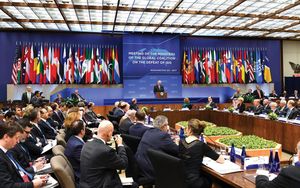Canada and Mexico have taken decisive measures to retaliate against new tariffs imposed by U.S. President Donald Trump, marking the onset of heightened trade tensions between North American neighbors. On February 1, 2024, Canadian Prime Minister Justin Trudeau announced plans for 25% tariffs on over $107 billion worth of American goods, with implementation set to begin on February 4, 2024. The retaliatory tariffs are seen as necessary actions against what Trudeau labeled as unjustified U.S. tariffs.
Trudeau stated, "We'll always do what's necessary to defend Canada and Canadians." He emphasized the strong historical ties between Canada and the U.S., and expressed regret over the necessity of these tariffs: "We didn't ask for this, but we will not back down." Significantly, beginning with $20.6 billion worth of goods, the tariffs will target products including whiskey, fruits like Florida oranges, and household goods, with full tariffs expected by the end of the month.
Meanwhile, Mexico is also preparing its countermeasures following the announcement of Trump’s sweeping tariffs, which include 25% taxes on both Canadian and Mexican imports. Mexican President Claudia Sheinbaum has communicated with Trudeau, indicating cooperation between Canada and Mexico as they navigate these challenging trade waters.
Trade relations between the U.S., Canada, and Mexico have been historically significant, with the three countries sharing extensive economic ties. Prior to Trump's tariffs, the U.S.-Mexico-Canada Agreement (USMCA) aimed at reducing barriers to trade, particularly agricultural products, between the nations.
Notably, U.S. agricultural exports to Canada and Mexico were valued at $75.9 billion through November 2024, highlighting the economic impact these tariffs could have on both sides of the border. Trudeau cautioned Americans about the potential repercussions, stating, "Tariffs against Canada will put your jobs at risk, potentially shutting down American auto assembly plants and other manufacturing facilities." He recognized broad impacts, warning costs would eventually increase for consumers: "People will feel it at the grocery store and at the gas pump."
For their part, Mexico, particularly its Economy Minister Marcelo Ebrard, has signaled strong discontent with the tariffs, which they view as damaging to their agricultural sectors. Ebrard expressed, "Shooting oneself in the foot," referring to the political and economic ramifications of targeting products from states likely to lobby Congress against such tariffs.
The trade war initiated by Trump has drawn criticism from members of the U.S. Congress. Rep. Angie Craig remarked, "No one wins in a trade war," highlighting how consumers might bear the brunt of increased prices for essentials such as avocados, tomatoes, and other goods affected by the new tariffs. Craig warned of the detrimental effects on both farmers and consumers, noting high input costs for agricultural production.
Trump’s trade policy appears to be aimed at re-establishing U.S. production priorities, declaring, "MAKE YOUR PRODUCT IN THE USA AND THERE ARE NO TARIFFS!" His administration positions the tariffs as necessary tools to level the trade playing field, citing past successes as justification for the current moves. Trump also emphasized the domestic benefits of reducing foreign dependence as part of his broader economic vision.
While Canada and Mexico gear up for retaliatory actions, they face the pressing challenge of preserving their economic interests against the backdrop of U.S. trade policies. The looming tariffs, particularly against agricultural products, raise serious concerns about the viability of the three countries' longstanding trading relationships. With the specter of increasing tensions, both nations are bracing for what could evolve beyond mere economic disputes, potentially impacting regional cooperation.
Given the scale and speed of this conflict, the coming weeks will be telling as Canada and Mexico implement their tariffs and observe the U.S. response. The potential for escalation remains high as both sides prepare to defend their economic interests amid shifting political landscapes.



